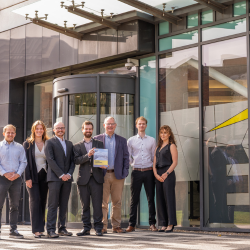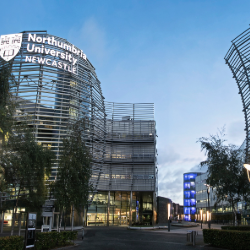-
Study
-
Quick Links
- Open Days & Events
- Unlock Your Potential
- Tuition Fees, Funding & Scholarships
- January Study
- Open Day 22nd November
-
Undergraduate
- Application Guides
- UCAS Exhibitions
- Extended Degrees
- School & College Outreach
- Information for Parents
-
Postgraduate
- Application Guide
- Postgraduate Research Degrees
- Flexible Learning
- Change Direction
- Register your Interest
-
Student Life
- Students' Union
- The Hub - Student Blog
- Accommodation
- Northumbria Sport
- Support for Students
-
Learning Experience
- Real-World Learning
- Research-enriched learning
- Graduate Futures
- The Business Clinic
- Study Abroad
-
-
International
International
Northumbria’s global footprint touches every continent across the world, through our global partnerships across 17 institutions in 10 countries, to our 277,000 strong alumni community and 150 recruitment partners – we prepare our students for the challenges of tomorrow. Discover more about how to join Northumbria’s global family or our partnerships.
View our Global Footprint-
Quick Links
- Course Search
- Undergraduate Study
- Postgraduate Study
- Information for Parents
- London Campus
- Northumbria Pathway
- Cost of Living
- Sign up for Information
-
International Students
- Information for International Students
- International Events
- Application Guide
- Entry Requirements and Education Country Agents
- Global Offices
- English Requirements
- English Language Centre
- International student support
- Cost of Living
-
International Fees and Funding
- International Undergraduate Fees
- International Undergraduate Funding
- International Masters Fees
- International Masters Funding
- International Postgraduate Research Fees
- International Postgraduate Research Funding
-
International Partners
- Agent and Representatives Network
- Global Partnerships
- Global Community
-
International Mobility
- Study Abroad
- Information for Incoming Exchange Students
-
-
Business
Business
The world is changing faster than ever before. The future is there to be won by organisations who find ways to turn today's possibilities into tomorrows competitive edge. In a connected world, collaboration can be the key to success.
More on our Business Services-
Business Quick Links
- Contact Us
- Business Events
- Research and Consultancy
- Education and Training
- Workforce Development Courses
- Join our mailing list
-
Education and Training
- Higher and Degree Apprenticeships
- Continuing Professional Development
- Apprenticeship Fees & Funding
- Apprenticeship FAQs
- How to Develop an Apprentice
- Apprenticeship Vacancies
- Enquire Now
-
Research and Consultancy
- Space
- Energy
- AI and Tech
- CHASE: Centre for Health and Social Equity
- NESST
-
-
Research
Research
Northumbria is a research-rich, business-focused, professional university with a global reputation for academic quality. We conduct ground-breaking research that is responsive to the science & technology, health & well being, economic and social and arts & cultural needs for the communities
Discover more about our Research-
Quick Links
- Research Peaks of Excellence
- Academic Departments
- Research Staff
- Postgraduate Research Studentships
- Research Events
-
Research at Northumbria
- Interdisciplinary Research Themes
- Research Impact
- REF
- Partners and Collaborators
-
Support for Researchers
- Research and Innovation Services Staff
- Researcher Development and Training
- Ethics, Integrity, and Trusted Research
- University Library
- Vice Chancellors Fellows
-
Research Degrees
- Postgraduate Research Overview
- Doctoral Training Partnerships and Centres
- Academic Departments
-
Research Culture
- Research Culture
- Research Culture Action Plan
- Concordats and Commitments
-
-
About Us
-
About Northumbria
- Our Strategy
- Our Staff
- Our Schools
- Place and Partnerships
- Leadership & Governance
- University Services
- Northumbria History
- Contact us
- Online Shop
-
-
Alumni
Alumni
Northumbria University is renowned for the calibre of its business-ready graduates. Our alumni network has over 250,000 graduates based in 178 countries worldwide in a range of sectors, our alumni are making a real impact on the world.
Our Alumni - Work For Us
What will I learn on this module?
After successfully completing Module 5 and having gained Independent Patrol Status will move seamlessly into the next module where you start to work towards FOC, and you will be deployed on your independent patrol phase.
This means you will be sent to operational incidents and calls for service on your own. However, this does not mean you will be unsupported as you will be closely supervised by your Sergeant as well as colleagues on your team. In addition, you will continue to gather evidence of your operational competence in your portfolio, again this will be reviewed by your operational supervisor and signed off by a qualified assessor. This module covers Year 2 which means you will have nearly 12 months to gather and submit your evidence for your portfolio. At the end of which you will have reached full operational competence. During your operational deployment, you will be supported by a nominated Response Sergeant and Area Support Team.
The Police Constable role and professional standards 3.1-3.4; 8.1- 8.7.
Communication Skills – 1.1-1.8;2.1-2.3;3.1-3.4;4.1-4.3;5.1-5.3
Decision Making and Discretion – 1.1
Victims and Witnesses- 1.1-1.6
Roads Policing – 2.1
Response Policing – 2.1-2.10;3.1-3.8;6.1-6.3;7.1-7.4
Suspect/offender management – 5.1-5.3.
Criminal Justice – 3.1-3.4;4.1-4.3
Conducting Investigations – 2.1 ;3.1 – 3.5 ;4.1;5.1;7.1-7.2
The full CoP National Policing curriculum will be accessible to module tutors via Durham Constabulary teams channel.
How will I learn on this module?
During this module you will use additional learning strategies that will include placements and work-based learning; both involve learning that is derived from observing, reflecting, and doing a job of work and taking on a role in the workplace.
How will I be supported academically on this module?
During the classroom-based sessions you will be supported through active participation and discussion during seminars and workshops. These offer a unique opportunity to consolidate the criminological, legal, and procedural policy underpinning specialist policing areas including response policing; policing communities; policing the roads; information and intelligence; conducting investigations. In addition, police trainers will guide you through a series of formative practical scenarios designed to consolidate all of your learning to date and provide you with confidence and momentum as you progress to your second operational phase.
What will I be expected to read on this module?
All modules at Northumbria include a range of reading materials that students are expected to engage with. The reading list for this module can be found at: http://readinglists.northumbria.ac.uk
(Reading List service online guide for academic staff this containing contact details for the Reading List team – http://library.northumbria.ac.uk/readinglists)
What will I be expected to achieve?
Knowledge & Understanding (K&U):
1. Demonstrate ability for critical and analytical reflection around police decision making in a range of complicated professional situations.
2. Be able to demonstrate advanced levels of knowledge and understanding around police powers, legislation, criminal procedure, police officer autonomy and discretion.
3. Demonstrate ability for critical and analytical understanding of issues around police governance and accountability structures.
Intellectual/Professional skills & abilities (IPSA):
4. Demonstrate competence in delivering lawful, ethical, safe, and effective front-line policing in your chosen specific professional area of police practice.
Personal Values Attributes (Global / Cultural awareness, Ethics, Curiosity) (PVA):
5. Demonstrate the ability for complex thinking around police knowledge and practice, including the ability to contextualise this in an evidence based policing framework.
How will I be assessed?
You will be asked to provide three pieces of evidence showing your underpinning knowledge, skills, and behaviours of your operational competence against each of the 15 OCP criteria (except criteria 2).
MLO 1, 2, 3, 4.
Opportunities for formative assessment and feedback include:
• Reflection around an area of the criteria development for the next year of your policing career linked to the student officer’s PDR.
Ongoing feedback on performance during specialist attachment.
• Alternatively, one appointment can be made with the academic lead, post course, to discuss an overview of plans at a convenient time for both student and tutor; students invited to make an appointment.
Pre-requisite(s)
N/A
Co-requisite(s)
N/A
Module abstract
This module sees you further develop the knowledge, understanding and practical policing skills you acquired though both the taught sessions and time spent on operational deployment during year 1 of the programme. After the initial 2-week class-based learning, you will deployed operationally and will have the opportunity to work in specialist areas other than frontline policing. During this module, you will be provided with the knowledge, skills, and practical experiences to enable you to successfully complete elements 1-15 of your Operational Competence Portfolio.
Course info
Credits 40
Level of Study Undergraduate
Mode of Study 30 months Full Time
School Humanities and Social Sciences
Location City Campus, Northumbria University
City Newcastle
All information is accurate at the time of sharing.
Full time Courses are primarily delivered via on-campus face to face learning but could include elements of online learning. Most courses run as planned and as promoted on our website and via our marketing materials, but if there are any substantial changes (as determined by the Competition and Markets Authority) to a course or there is the potential that course may be withdrawn, we will notify all affected applicants as soon as possible with advice and guidance regarding their options. It is also important to be aware that optional modules listed on course pages may be subject to change depending on uptake numbers each year.
Contact time is subject to increase or decrease in line with possible restrictions imposed by the government or the University in the interest of maintaining the health and safety and wellbeing of students, staff, and visitors if this is deemed necessary in future.
Useful Links
Find out about our distinctive approach at
www.northumbria.ac.uk/exp
Admissions Terms and Conditions
northumbria.ac.uk/terms
Fees and Funding
northumbria.ac.uk/fees
Admissions Policy
northumbria.ac.uk/adpolicy
Admissions Complaints Policy
northumbria.ac.uk/complaints












